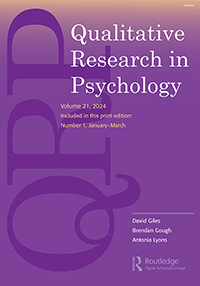“相信我,我们可以解决这个问题”:一项关于认知信任在培养关系中作用的理论测试案例研究
IF 4.4
3区 心理学
Q1 PSYCHOLOGY, MULTIDISCIPLINARY
引用次数: 6
摘要
新颖的心理学理论通常以一般或启发式的形式构思,可以通过特定情境的理论测试来发展和细化。在这里,提出了一种理论检验的单一案例研究方法,该方法改编自精神分析领域的一种方法。该研究通过对一个相对较新的儿童发展理论——认知信任理论的解释价值的质疑,在寄养照顾者(“约翰”)和他们照顾的年轻人(“巴斯特”)之间关系的背景下,举例说明了这种方法。使用深度访谈材料,认识论信任理论可以帮助理解这种培养关系的方式和程度进行了检查。我们讨论了认识论信任理论发展的意义以及这些发现在社会工作环境中的应用。探讨了这种理论检验案例研究方法的优势和局限性。本文章由计算机程序翻译,如有差异,请以英文原文为准。
‘Trust me, we can sort this out’: a theory-testing case study of the role of epistemic trust in fostering relationships
ABSTRACT Novel psychological theories are often conceived in a general or heuristic form that can benefit from development and granulation through context-specific theory testing. Here, a theory-testing single case study methodology, adapted from an approach developed in the field of psychoanalysis, is presented. The study exemplifies this methodology though an interrogation of the explanatory value of a relatively new child development theory, the theory of epistemic trust, in the context of the relationship between a foster carer (“John”) and a young person in their care (“Buster”). Using in-depth interview material, the ways and extent to which the theory of epistemic trust could aid understanding of this fostering relationship are examined. We discuss the implications for the development of the theory of epistemic trust and the applications of these findings to social work contexts. The strengths and limitations of this theory-testing case study approach are explored.
求助全文
通过发布文献求助,成功后即可免费获取论文全文。
去求助
来源期刊

Qualitative Research in Psychology
PSYCHOLOGY, MULTIDISCIPLINARY-
CiteScore
20.00
自引率
0.50%
发文量
14
期刊介绍:
Qualitative Research in Psychology is an international, peer-reviewed journal that publishes high-quality, original research. It aims to become the primary forum for qualitative researchers in all areas of psychology, including cognitive, social, developmental, educational, clinical, health, and forensic psychology. The journal also welcomes psychologically relevant qualitative research from other disciplines. It seeks innovative and pioneering work that advances the field of qualitative research in psychology.
The journal has published state-of-the-art debates on various research approaches, methods, and analytic techniques, such as discourse analysis, interpretative phenomenological analysis, visual analyses, and online research. It has also explored the role of qualitative research in fields like psychosocial studies and feminist psychology. Additionally, the journal has provided informative articles on ethics, transcription, interviewee recruitment, and has introduced innovative research techniques like photovoice, autoethnography, template analysis, and psychogeography.
While the predominant audience consists of psychology professionals using qualitative research methods in academic, clinical, or occupational settings, the journal has an interdisciplinary focus. It aims to raise awareness of psychology as a social science that encompasses various qualitative approaches.
In summary, Qualitative Research in Psychology is a leading forum for qualitative researchers in psychology. It publishes cutting-edge research, explores different research approaches and techniques, and encourages interdisciplinary collaboration.
 求助内容:
求助内容: 应助结果提醒方式:
应助结果提醒方式:


